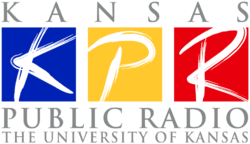KANU (FM)
 | |
| City | Lawrence, Kansas |
|---|---|
| Broadcast area | Northeast and east-central Kansas |
| Branding | Kansas Public Radio |
| Frequency | 91.5 MHz (also on HD Radio) |
| Translator(s) |
89.9 K210CR (Atchinson) 97.9 K250AY (Manhattan, relays HD2) 96.1 K241AR (Lawrence, relays HD2) 99.5 K258BT (Manhattan) |
| Repeater(s) |
89.7 KANH (Emporia) 90.3 KANQ (Chanute) 91.3 KANV (Olsburg) |
| First air date | 1952 |
| Format |
NPR news, classical music, jazz HD2: NPR news, BBC World Service "KPR2" |
| ERP | 100,000 watts |
| HAAT | 213 meters |
| Class | C1 |
| Facility ID | 69350 |
| Transmitter coordinates | 38°57′14.00″N 95°16′11.00″W / 38.9538889°N 95.2697222°W |
| Callsign meaning | KANsas University |
| Affiliations | National Public Radio, Public Radio International, American Public Media |
| Owner | University of Kansas |
| Webcast |
KPR Webstream KPR2 Webstream |
| Website |
kansaspublicradio |
KANU is the flagship station of Kansas Public Radio (KPR), a seven-station network based in Lawrence at the University of Kansas. In addition to KANU (91.5 FM), KPR also operates full-power stations KANH in Emporia (at 89.7 FM), KANV in Olsburg (at 91.3 FM, serving Manhattan and Junction City), and KANQ in Chanute (at 90.3 FM); and low-power translators K210CR in Atchison (at 89.9 FM), and K258BT (99.5 FM) and K250AY (97.9 FM) in Manhattan.
Together, the stations cover all of northeastern Kansas, as well as large portions of Missouri, including Kansas City. KPR serves as the main NPR station for the state capital, Topeka, and provides much of the Kansas City area a second choice for NPR programming alongside KCUR.
From the KANU studio in Lawrence, KPR broadcasts mostly classical music, National Public Radio news, jazz, and folk/bluegrass music. KANH, KANV, K210CR and K258BT serve as full repeaters of KANU.
KPR also operates an HD2 signal, which broadcasts a mix of National Public Radio and BBC news-talk programming. That signal is available online or with a special HD Radio. However, KANQ and K250AY broadcast the HD signal on a standard FM frequency.
A subcarrier of all KPR’s signals broadcasts the Kansas Audio-Reader Network for the blind and print handicapped. The studios for both KPR and Audio-Reader are located in KU’s Broadcasting Hall.
History
KANU signed on for the first time on September 15, 1952. In 1961, it became the first noncommercial FM station to broadcast in stereo. It was a charter member of NPR, and was one of the 90 stations to carry the initial broadcast of All Things Considered in 1971.
KANU won a Peabody Award in 1974 for its weekly hour "The American Past," hosted by journalism professor Calder Pickett. The program mixed audio clips and music of earlier times with historical narration, and was broadcast for 32 years until Pickett retired in 2005. The station also became known for classical music programs such as "Opera Is My Hobby," hosted by Dr. Jim Seaver weekly for 59 years and Dick Wright's "The Jazz Scene" on Saturday mornings.
In 2003, KANU adopted the more inclusive slogan Kansas Public Radio to its rapidly growing broadcast footprint.
External links
- Query the FCC's FM station database for KANU
- Radio-Locator information on KANU
- Query Nielsen Audio's FM station database for KANU
- Query the FCC's FM station database for KANH
- Radio-Locator information on KANH
- Query Nielsen Audio's FM station database for KANH
- Query the FCC's FM station database for KANQ
- Radio-Locator information on KANQ
- Query Nielsen Audio's FM station database for KANQ
- Query the FCC's FM station database for KANV
- Radio-Locator information on KANV
- Query Nielsen Audio's FM station database for KANV
.svg.png)